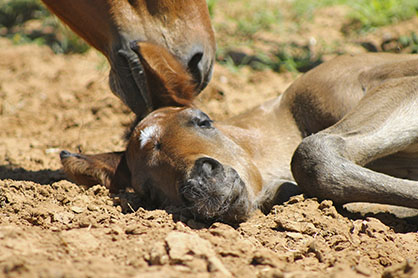By: Kentucky Equine Research
When horse owners hear the word “colostrum,” many think of the immunity-building, infection-fighting immunoglobulin G (IgG)—a protein found in the mare’s first milk. According to a recent study*, however, colostrum has several elements that benefit foals.
Researchers believe pro-inflammatory proteins help stimulate a foal’s immune system to function appropriately, helping to activate immune system memory, rather than directly fighting infection. “Even after ingesting sufficient colostrum, foals remain at risk for infection with bacteria and other disease-causing organisms, called pathogens, which adult horses can easily fend off,” explained Kathleen Crandell, Ph.D., a Kentucky Equine Research (KER) nutritionist.
Not only are foals void of circulating IgG when they are born, they also lack preformed, circulating immune cells that fight specific bacteria and viruses, such as B and T cells. In contrast, the immune system of adult horses produces B and T cells after they are exposed to one or more pathogens. Those B and T cells effectively serve as the immune system’s memory, making it easier for horses to resist those same pathogens should they be exposed to them in the future.
In adults, specific proteins called cytokines circulate in the bloodstream and help stimulate the immune system to respond to infectious agents. Examples include tumor necrosis factor, interferon, and interleukins (IL) 6 and 8. Whether or not foals obtain these important infection-fighting cytokines from colostrum was a question an Italian research group wanted to answer.
After analyzing colostrum from 14 mares and blood samples from foals collected at birth and again 24 hours later, researchers found that cytokines are passed in colostrum from mare to foal and play an important role in passive transfer of immunity. Interestingly, the studied interleukins, most notably IL-4, fall under the umbrella of pro-inflammatory rather than anti-inflammatory molecules. Researchers believe pro-inflammatory proteins help stimulate a foal’s immune system to function appropriately, helping to activate immune system memory, rather than directly fighting infection.
In sum, the authors acknowledge that “colostrum, containing not only antibodies but also other molecules such as growth factors, cytokines, lymphoid and non-lymphoid cells, should be studied in greater depth to better understand the cytokine profile of neonatal foals.”
“Other ways to improve colostrum quality include ensuring that the mare has a properly fortified and balanced overall diet, that she has an appropriate body condition score—not too fat or too thin—supplementing the mare with natural vitamin E, particularly when fresh-grass consumption is low or not available, and providing yeast and DHA found in fish oils like EO•3. Each of these strategies impacts IgG in colostrum,” added Crandell.
*Mariella, J., C. Castagnetti, A. Prosperi, et al. 2017. Cytokine levels in colostrum and in foals’ serum pre- and post-suckling. Veterinary Immunology and Immunopathology. 185:34-37.











